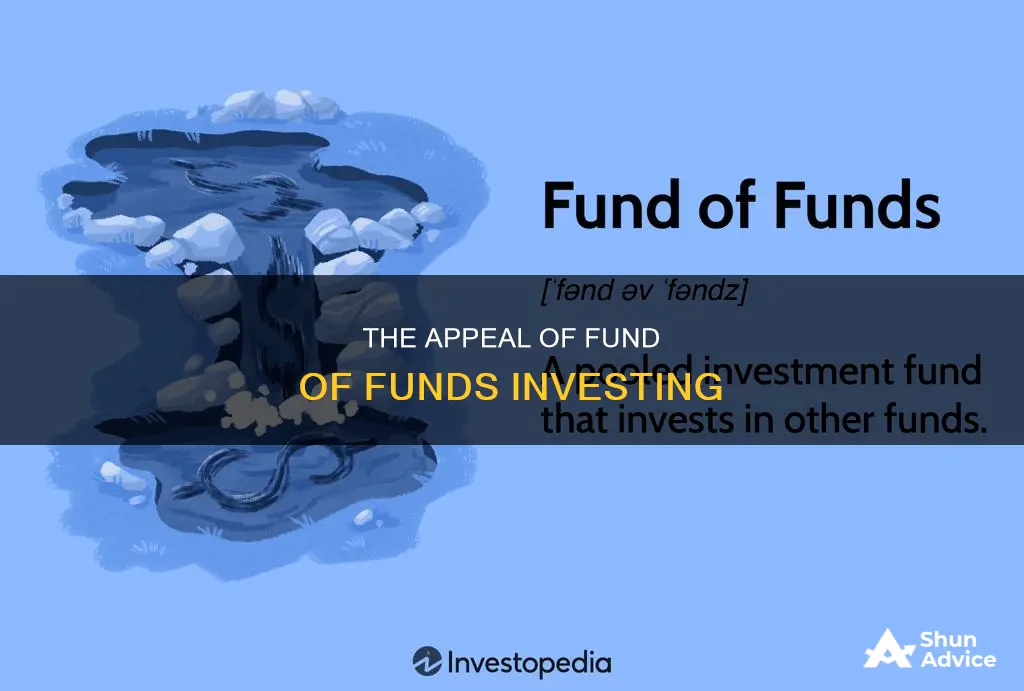
Fund of funds (FOF) investing is appealing because it offers an easy and cost-effective way to diversify your portfolio. Instead of investing directly in individual stocks, bonds, or other assets, FOFs invest in a portfolio of other investment funds, providing access to a wide range of asset classes and investment strategies. This diversification can help to reduce risk and potentially lead to higher returns over time. FOFs also offer professional management, with experienced fund managers conducting thorough due diligence, selecting quality funds, and continuously monitoring and rebalancing the portfolio. This can be especially appealing to investors with limited funds or experience in choosing mutual funds. However, it's important to consider the higher fees associated with FOFs, which can impact overall returns, as well as the potential for diluted returns due to excessive diversification.
| Characteristics | Values |
|---|---|
| Type | Multi-manager investment |
| Investment approach | Pools investment capital into a wider portfolio of several investment funds |
| Investment type | Mutual funds, exchange-traded funds, hedge funds |
| Benefits | Diversification, access to premium investment opportunities, professional management, simplified investment process |
| Drawbacks | Higher expense ratios, risk of diluted returns, complexity, opaque nature of the investment |
| Suitability | Long-term stability and growth |
What You'll Learn

Access to premium investment opportunities
Funds of Funds (FOFs) are an appealing investment vehicle as they offer access to exclusive investment opportunities that individual investors might not otherwise reach. FOFs pool investors' capital, allowing them to invest in high-performing mutual funds, hedge funds, or private equity funds. This enables investors to participate in sophisticated strategies and high-potential ventures that are typically reserved for institutional players.
Diversification and Risk Mitigation
The main advantage of FOFs lies in their ability to provide exceptional diversification. By investing in various underlying funds, FOFs spread risk across multiple asset classes and investment strategies. This broad investment exposure helps to mitigate the impact of individual poor-performing funds, potentially resulting in more stability and higher returns over time.
Professional Management and Due Diligence
FOFs also offer professional management, with experienced fund managers conducting thorough due diligence, selecting quality funds, and continuously monitoring and rebalancing the portfolio. FOF managers conduct extensive research, including analysing past returns, risk metrics, and fund managers' expertise, to make informed investment decisions.
Streamlined Investment Process
Additionally, FOFs simplify the investment process by bundling multiple funds into a single investment vehicle. This convenience allows investors to achieve broad market exposure and effective diversification without the need to research and manage each investment themselves.
Access to Exclusive Funds and Strategies
FOFs provide access to exclusive funds and investment strategies that may not be available to individual investors. For example, FOFs can invest in high-performing mutual funds with high minimum investment thresholds, making these funds accessible to a wider range of investors.
Suitability for a Range of Investors
The access to premium investment opportunities that FOFs provide is particularly beneficial for investors with smaller amounts of capital, limited ability to diversify, or less experience in choosing mutual funds. FOFs give these investors the opportunity to participate in sophisticated investment strategies and access exclusive funds that would otherwise be out of reach.
In summary, the appeal of FOFs lies in their ability to offer access to premium investment opportunities, exceptional diversification, professional management, and a streamlined investment process. These benefits make FOFs a compelling option for investors seeking to maximise their investment potential while minimising risk.
TSP Funds: Where to Invest for Maximum Returns
You may want to see also

Diversification
By investing in multiple underlying funds, FOFs spread risk across many asset classes and investment strategies, reducing the impact of individual poor-performing funds. This diversification can result in more stability and potentially higher returns over time.
FOFs also allow investors to access premium investment opportunities that may not be accessible to individual investors. These funds can invest in high-performing mutual, hedge, or private equity funds, enabling investors to participate in sophisticated strategies and high-potential ventures typically reserved for institutional players.
Additionally, FOFs provide professional management, with experienced fund managers conducting thorough due diligence, selecting quality funds, and continuously monitoring and rebalancing the portfolio. This expertise can lead to better asset allocation and risk management, and improved performance.
The FOF structure simplifies the investment process by bundling multiple funds into a single investment vehicle, making it an attractive option for both novice and experienced investors seeking a diversified portfolio.
Best Mutual Funds for Tax Savings: Where to Invest?
You may want to see also

Professional management
A fund of funds (FOF) offers professional management, which means investors benefit from the expertise of skilled fund managers. This is particularly appealing to those who lack the knowledge or desire to pick individual funds or strategize ways to minimize their risk.
FOFs are often used by investors with smaller amounts to invest, limited ability to diversify, or less experience in choosing mutual funds. They give the little guy access to professional management and diversification that were once reserved for the wealthy.
FOF managers select funds based on their performance, management quality, and investment strategy. This involves conducting due diligence, including analyzing past returns, measures of risk, and fund managers' expertise.
The professional management provided by FOFs can give investors the ability to spread their dollars among thousands of stocks with a single purchase, while counting on expertise that investors themselves may not have. Rather than assuming the risk of selecting one individual manager, an FOF provides a portfolio of managers with a single investment.
Most FOFs have a formal due diligence process and will conduct background checks before selecting new managers. This can include researching the backgrounds and verifying the credentials of fund managers.
FOFs can be a pain-free entrance into professional diversification for investors with limited funds or experience. However, investors should read the fund's marketing and related materials to understand the level of risk involved in the fund's investment strategies.
Bond Funds: Where to Invest Now?
You may want to see also

Simplified investment process
Investing in a fund of funds (FOF) simplifies the investment process by bundling multiple funds into a single investment vehicle. This convenience allows investors to achieve broad market exposure and effective diversification without needing to research and manage each investment themselves. This makes it an attractive option for both novice and experienced investors.
FOFs are a type of investment that pools investment capital into a wider portfolio of several investment funds instead of investing directly in single funds or specific individual securities. This approach has grown in popularity in recent years, particularly among institutional investors like pension funds and endowments, as it allows them to spread risk and maximise returns.
FOFs are often referred to as "multi-manager" investments because they give investors access to the expertise of multiple skilled fund managers. Fund managers use this approach to diversify among different kinds of funds and access expertise they might not otherwise have.
FOFs are available to meet a range of investment styles and goals. They can be "fettered", meaning they only invest in funds managed by the same company, or "unfettered", meaning they invest in funds from any management company.
By investing in an FOF, individuals can achieve a properly allocated, risk-appropriate and well-diversified strategy with a single investment. This makes FOFs ideal for savers who don't want to deal with watching the markets, making adjustments, and creating their own investment allocations.
FOFs can also be a good choice for those without the knowledge or desire to pick individual funds or strategise ways to minimise their risk. They can be a pain-free entrance into professional diversification for investors with limited funds or experience.
Smart Strategies for Choosing the Right Mutual Fund
You may want to see also

Set-it-and-forget-it potential
Investing in a fund of funds (FOF) is appealing to those looking for a "set-it-and-forget-it" investment strategy. This is because FOFs are a type of investment fund that pools investment capital into a wide range of different investment funds, providing broad exposure to many different asset classes with less risk involved.
FOFs are often used by investors who have smaller amounts of money to invest, limited ability to diversify, or who are inexperienced in choosing investment funds. They are a way for the little guy to access professional management and diversification, which have traditionally been reserved for the wealthy.
Here's how it works: when you invest in an FOF, you are essentially “hiring a general contractor” to do the research on other fund managers, balance the overall risk, and ensure the entire project runs smoothly. This means you don't have to worry about actively managing your investments or conducting extensive research. Instead, you can leave it to the experts, who will select a range of different investment funds to diversify your portfolio and spread the risk.
This "set-it-and-forget-it" potential is particularly appealing to savers who don't want to deal with watching the markets, making adjustments, and creating their own investment allocations. With an FOF, you can make a single investment today in a target-date fund, for example, and hold it until you retire or even longer.
Of course, there are some drawbacks to consider. FOFs typically have higher fees because you are paying for the management of the FOF itself, as well as the fees of the underlying investment funds. This can result in a significant drag on your overall investment returns. Additionally, the extensive diversification offered by FOFs can sometimes lead to weaker returns, as the performance of high-performing assets may be offset by lower-performing ones.
Despite these potential drawbacks, FOFs can be a great option for those seeking a hands-off, long-term investment strategy. They provide broad exposure to the markets, professional management, and diversification, all in one convenient package.
Target Date Funds: Understanding Your Investment Options
You may want to see also
Frequently asked questions
Fund of funds (FOF) investing is appealing because it offers an easy and cost-effective way to achieve a diversified investment portfolio. FOFs also provide access to premium investment opportunities and professional fund management.
Investing in a fund of funds offers several benefits, including:
- Diversification: FOFs invest in a range of underlying funds, spreading risk across multiple asset classes and investment strategies. This diversification can help mitigate the impact of poor-performing funds and potentially lead to higher returns over time.
- Access to premium investment opportunities: FOFs provide access to exclusive investment opportunities that individual investors may not be able to reach on their own.
- Professional management: FOFs are managed by experienced fund managers who conduct thorough due diligence, select quality funds, and continuously monitor and rebalance the portfolio.
- Simplified investment process: FOFs bundle multiple funds into a single investment vehicle, making it convenient for investors to achieve broad market exposure and effective diversification without the need for extensive research.
While fund of funds investing offers several advantages, there are also some potential drawbacks to consider:
- Higher fees: FOFs typically have higher expense ratios due to the layered fees structure. Investors pay fees for both the FOF management and the underlying funds, which can significantly impact overall returns.
- Diluted returns: The extensive diversification of FOFs can sometimes lead to weaker returns as the performance of high-performing assets may be offset by lower-performing ones.
- Complexity and lack of transparency: Understanding and evaluating FOFs can be complex due to their multilayered nature. Additionally, FOFs may provide less transparency compared to more traditional investments, making it difficult for investors to fully understand their investments.







